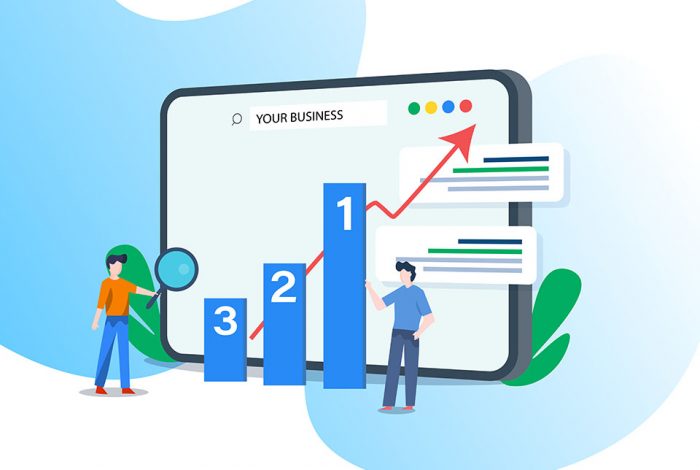6.5 min read -
How to rank higher on Google.

Do you find your website being ranked lower and lower despite your best efforts to improve your google ranking? There is nothing more frustrating than spending money and time trying to rank higher, and despite your endeavor, you find your page on the last “o” in Google search results. You are not alone. Google’s algorithm is consistently changing and improving the internet as a whole.
If you aren’t focused on Google analytics and search engine optimization (SEO), your website becomes a proverbial boat with holes in the hull.
So how do you risk sinking into the abyss?

The first step is to audit your website and assess your performance. Don’t get discouraged if your results aren’t optimal. Keep in mind that building organic search directly relates to organic traffic and it takes time. Ranking higher in the SERPs requires a targeted SEO strategy. Audits refine your online presence, and by implementing the corrections, you ensure that you provide high-quality content and prove that you are an authority in your industry.
You may feel like Google is hard on you and that they hate your website, but that is not the case. Google wants the internet to become a community where we all grow in a symbiotic fashion. The only way to achieve that is to sift and sort the non-compliant fodder to the bottom of the search ranking.
So now what?
You have to patch the holes in your website and refine your brand. Here are 8 steps to getting a higher rank on Google.

1. Know your audience and what they want
The first step is to understand and define who your searcher is. Secondly, what is their search intent, and precisely decipher their search query. If you do a simple google search in your area of expertise, check and see if your competitor uses keywords and phrases that you aren’t utilizing on your website? Those keywords may be the key to targeting that search traffic in your direction. If you know what your audience wants to learn, you need to add as many targeted words and phrases throughout your web pages. Google will reward you for understanding what types of content your audience needs.
2. Page rankings are directly correlated to your URLs and keywords
Then check your meta description: this is the text that SERPs (search engine results pages) display as a snippet. This description is the most vital and concise description of what you do. Use keywords and make sure they rank high. The better the keywords, the higher rankings you will get. You want to try and find keywords that have high search volume. This step is crucial in ensuring that you grasp your reader’s attention. Organic traffic is as important as your google rank. Your click-through rate will improve if you lay the groundwork with descriptive URLs that convey that you are the best and why your website stands above your competition.
3. Stay compliant with Google
In addition, technical SEO, on-Page SEO, and domain authority are all ranking factors. The more of these items you improve, the better your business will do in reaching your target audience. Backlinking your pages will build your reputation. The higher your reputation, the more traffic you will see. As we said before, linking your web pages and backlinking to other authoritative websites sends a powerful message that you are an expert in your area of commerce and that your page is an authority on the subject.
4. Keep Google happy
A calculated SEO compliance strategy is the solution. Google bots incessantly index web pages, checking for weaknesses and inconsistencies, such as internal links, indexing web pages, and checking for flaws and inconsistencies, such as internal links, broken backlinks, and consistent title tags. Broken links are not tolerated, and there are google penalties for non-compliance. Anchor text is the text that becomes your link and points to your page. There are some rules to keep in mind when linking. Avoid using exact match anchor text when you create links. Google hates it and correlates it to low-quality linking. There is a correlation between an expected CTR (click-through rate) and google ranking. If a searcher lands on your page and returns to the google home page within seconds, you will be flagged. This is considered a high bounce rate and your content is not answering your target audience’s questions. A high bounce rate will lower your odds of landing on the first page of the search engine.
5. Keep an eye on your metrics
By creating a Google My Business profile, you can significantly improve your SEO. If you find that your Google business profile is weak, you need to update images, add reviews, and use social media channels to post relevant content. Keep in mind that local business and local SEO is easier to build. When your customer does a local search, you want to make sure you rise above your competition. Consequently, your specific keywords and target keywords need to be strong. Pro tip: Although social media doesn’t specifically boost SEO, utilize social media channels and hashtags to post new relevant content to expand your audience and advertise as an authority.
6. Mobile-friendly websites aren’t optional
In recent years Google has updated its algorithm to focus on mobile devices. Google encourages businesses to comply with modern-day web development standards using newer tech like AMP (accelerated mobile pages) to enhance user experience. AMP is essentially a very stripped-down version of your web pages although in recent studies AMP hasn’t been as hot of a topic as it once was. It removes all non-essential code to optimize mobile performance page speed. Although, just optimizing your web vitals is arguably a more effective approach to better SEO. This mobile-friendly movement has hurt several businesses that have fallen short of maintaining compliance with new SEO gold standards.
7. Get your SSL Certificate and keep it current
Cybersecurity is a threat to every website, especially WordPress sites. It is even more of a concern to your customer. If a searcher clicks onto your website and your SSL Cert isn’t up to date, they will most likely navigate away from your domain. Online security is not optional, especially since we have already shown you what happens to your ranking when your bounce rate increases. If your website runs on a WordPress site, there are dozens of security options that we will cover in another article. The bottom line is managing domain vulnerabilities is critical.
8. Content, content, content
Digital content creation is an art form. You want to prioritize this above all else. Great content captivates, and amazing content sells! Digital marketing depends on harnessing your audience’s attention. Don’t be afraid to hire an expert in this area. Your content must evolve and grow to remain relevant. Cutting-edge graphics are essential, and keyword-rich content is ever better. The key with content is to outperform your competitors. Staying on the cutting-edge of both trends and topics is paramount to your success! Blogging is an excellent opportunity to boost your keywords and continually add new content to your web presence. Continuously adding content is a very important factor, more than you may realize. Google likes to see that you’re staying on top of your site. Skilled bloggers perform keyword research to optimize their content and improve your indexing rank. With an average blog containing 1,000 to 3,000 words, blogging can become a goldmine for link-building possibilities and rich snippets of SEO opportunities.
Following these simple steps can improve your Google rank and keep your business afloat for years to come.

Does this sound overwhelming? Contact Us.
Zero8 Studios is a one-stop-shop solution for SEO, web design, digital content creation, and marketing. We have solutions from small businesses to enterprise levels. Our agency uses cutting-edge tactics to grow your business, keep it secure, and rise above your competition.
Check out our testimonials.
Phone number: 844-338-4263

